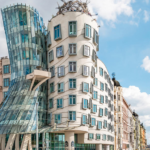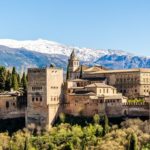It was a surrealist time to be British. Six years of total war had left the people with their men and womenfolk dead, wounded and crippled as well as bemedalled, heroic and stoic. Most people had lost their home (or homes) to the German bombing. France and Belgium, just over the narrow Channel, had been occupied throughout almost all the Second War, and were recovering much faster than the British. The latter, having listened avidly to the words of a fat old man with a fondness for brandy and cigars asking them to sacrifice everything to beat the German menace, and having followed his indefatigable leadership, showed their loyalty by throwing him and his party out in the 1945 elections. The new Prime Minister was Clement Attlee, an Old Harrovian, who had been Churchill’s Deputy PM during the war. He was one of those patricians who become members of the Labour Party, presumably to reward their parents for sacrificing everything to educate them privately. He was all for NATO, against private incomes and country life.
Most things seemed worse after the War than during it. Food was still severely rationed, even three years after the atomic bombs over Hiroshima and Nagasaki. The food you could get hold of by hook or by crook was poorer in quality than during the War; housing was scarce, taxes heavier and heavier. The rich suffered with the poor; Lord Astor was supposed to collect £200,000 per year but after taxation he got one hundred and fifty. The Tollemache brewing family did not even receive sixpence from each pound. Lord Wellesley, descendent of the Duke of Wellington, was supposed to earn £40,000 a year from rents. He was lucky to hang on to four thousand of it.
A series of incredibly severe winters came and went, with hardly any fuel to burn and less electricity; the nation shivered in their coats if they had one. You could not escape for a week to warmer climates if you could afford it, because your cash allowance for the entire holiday was five pounds. The irony was supreme for during the fighting travel abroad was virtually compulsory, but now it was difficult even to go from Dover to Calais, but oddly enough many people did go on day outings from Dover and Folkestone or even to the Hook of Holland – to buy decent food and bring it back, a kind of smuggling frowned on by the authorities!
The victors of the War were sailing to ports in defeated, occupied countries in order to buy food! It was surreal all right.
The War had meant horror and destruction, but it had been a time of honour and even glory for Britain and her Commonwealth – but now she was bankrupt, with over the pond the Americans rubbing their hands in glee as they watched the British Empire disintegrate. Britain had won with their perfectly-timed help , and now could only look forward to a decline and the daily slog of a precarious peace.
A New Order had arrived with Labour’s election victory. Learned men in glasses enforced savings and economies and tightened belts and five inches of hot bathwater once a week. Things got better though; butter re-appeared after years of a lick of margarine mostly made from whale blubber. The ‘National Restaurants’ vanished to be replaced by Lions’ Corner Houses serving hot food with chips.
Labour said it offered Hope to Millions: it was not revolutionary as many had suspected or hoped; Labour represented the economic and cultural triumph of the masses over the privileged. The new watchword was ‘Austerity’. And austere life was until the masses suddenly saw through it and voted Conservative again in 1951. Unfortunately the grandson of a Duke was re-elected with it. All wrong, and just as surreal.
An ordinary French village grocery shop looked to my fifteen year old eyes in 1952 like Heaven itself. But France had been occupied by the Nazis for nearly six years! It was more than surreal; it was pure Marx Brothers.











Leave A Comment